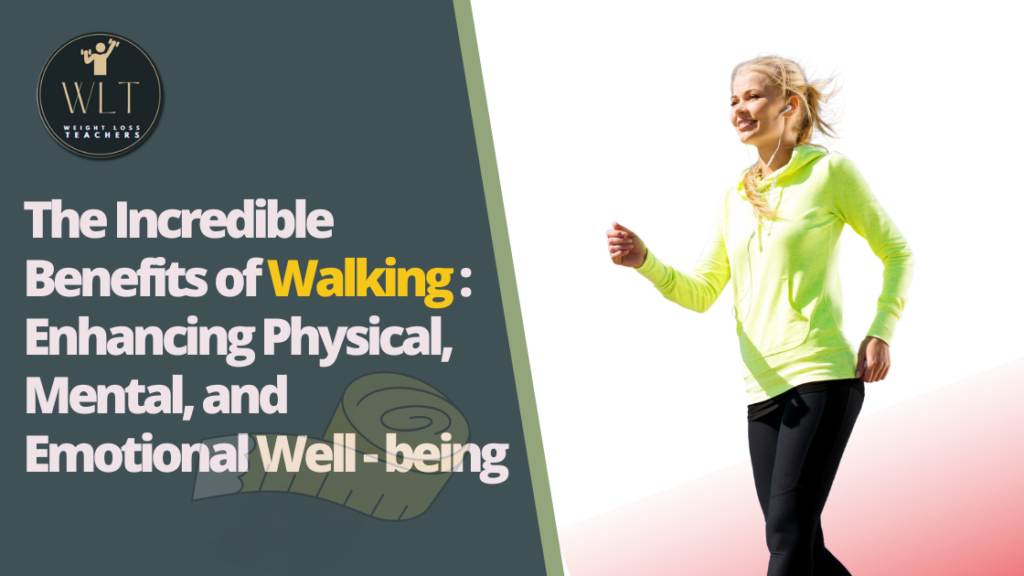
The Incredible Benefits of Walking: Enhancing Physical, Mental, and Emotional Well-being

Walking, a seemingly simple and ordinary activity holds profound benefits that can transform our lives. Whether it’s a leisurely stroll or a brisk power walk, engaging in regular walking routines has the power to improve our physical, mental, and emotional well-being.
Table of Contents
Benefits of Walking
In this comprehensive article, we will delve into the numerous advantages that walking brings to our lives, offering insights into how it can enhance our overall quality of life.
Physical Health Benefits

- Improved Cardiovascular Health: Walking provides a low-impact aerobic workout that strengthens the heart and circulatory system. It reduces the risk of heart disease, lowers blood pressure, and enhances overall cardiovascular health.
- Weight Management and Metabolism Boost: Engaging in regular walking aids in weight management by burning calories, increasing metabolism, and promoting fat loss. It is an effective exercise for maintaining a healthy body weight.
- Strengthened Muscles and Bones: Walking engages various muscle groups, enhancing strength, endurance, and flexibility. Regular walking also promotes bone density, reducing the risk of osteoporosis and fractures.
- Enhanced Joint Health: Contrary to high-impact activities, walking is gentle on the joints, making it an ideal exercise for individuals with arthritis or joint issues. It improves joint flexibility, reduces pain, and strengthens supporting structures.
- Increased Energy Levels: Walking boosts energy levels by improving oxygen circulation and enhancing overall fitness. Regular walking increases stamina, reduces fatigue, and promotes vitality.
- Improved Digestion and Metabolic Function: Walking aids in digestion by promoting peristalsis and reducing the risk of constipation. It improves metabolic function, aiding in the efficient absorption of nutrients.
Mental and Cognitive Benefits

- Reduced Risk of Cognitive Decline: Regular walking has been linked to a decreased risk of cognitive decline and neurodegenerative diseases such as Alzheimer’s and dementia. It enhances brain function, memory, and cognitive abilities.
- Boosted Mood and Emotional Well-being: Walking stimulates the release of endorphins, neurotransmitters that promote feelings of happiness and well-being. It reduces stress, anxiety, and depression, fostering a positive mental state.
- Enhanced Creativity and Productivity: Walking stimulates the brain and enhances creativity. Taking a walk during breaks or brainstorming sessions can improve problem-solving skills, boost productivity, and enhance overall cognitive performance.
- Improved Sleep Quality: Regular physical activity like walking helps regulate sleep patterns, improves sleep quality, and reduces insomnia. It promotes relaxation and helps individuals achieve a restful night’s sleep.
- Stress Reduction and Relaxation: Walking in natural environments or green spaces has a calming effect on the mind and body. It reduces cortisol levels, lowers stress, and promotes relaxation and mindfulness.
- Increased Self-esteem and Confidence: Engaging in regular walking routines boosts self-esteem and self-confidence. Achieving personal fitness goals, improving physical appearance, and feeling more energized contribute to an enhanced sense of self-worth.
Social and Environmental Benefits

- Social Interaction and Community Engagement: Walking provides opportunities for social interaction, such as walking groups or participating in organized walks. It fosters a sense of community, encourages new connections, and combats social isolation.
- Environmental Sustainability: Choosing to walk instead of relying on motorized transportation reduces carbon emissions, helping combat climate change. Walking promotes environmental sustainability and encourages a greener lifestyle.
- Accessibility and Affordability: Walking is a highly accessible and affordable form of exercise. It does not require expensive equipment or gym memberships, making it an accessible activity for people of all ages and backgrounds. Whether in urban or rural areas, walking can be easily incorporated into daily routines.
- Connection with Nature: Walking allows individuals to connect with nature and appreciate their surroundings. Whether it’s a stroll in a park, a hike in the mountains, or a beachside walk, spending time outdoors during walks promotes a sense of well-being and rejuvenation.
- Reduced Traffic Congestion: By choosing to walk for shorter distances instead of using vehicles, individuals contribute to reducing traffic congestion and associated problems. Walking can be a practical and efficient mode of transportation for shorter commutes, benefiting both individuals and communities.
- Enhanced Safety: Walking is a safe activity that poses minimal risk compared to other forms of exercise. It does not involve high speeds or machinery, reducing the likelihood of accidents or injuries. However, it’s essential to follow pedestrian safety guidelines and use designated paths or sidewalks.
Long-Term Health Benefits

- Chronic Disease Prevention: Regular walking has been linked to a decreased risk of chronic diseases, including type 2 diabetes, certain cancers, and stroke. It helps maintain healthy blood sugar levels, reduces inflammation, and supports overall health.
- Improved Immune Function: Engaging in moderate-intensity activities like walking boosts the immune system, reducing the risk of common illnesses such as colds and flu. It enhances immune response and supports the body’s natural defense mechanisms.
- Longevity and Aging Gracefully: Studies have shown that regular walking is associated with increased life expectancy. It promotes healthy aging, maintains cognitive function, and enhances physical fitness, allowing individuals to enjoy a higher quality of life in their later years.
- Prevention of Sedentary Lifestyle-related Issues: Walking is an excellent way to combat the negative effects of a sedentary lifestyle. Prolonged sitting has been linked to various health issues, including obesity, cardiovascular disease, and musculoskeletal problems. Incorporating regular walks breaks up sedentary behavior and promotes an active lifestyle.
Conclusion
Walking, a simple and accessible activity holds an array of remarkable benefits for our physical, mental, and emotional well-being. From improving cardiovascular health to enhancing cognitive function and reducing stress, the advantages of walking are extensive and diverse. Moreover, it fosters social connections, supports environmental sustainability, and contributes to long-term health. By incorporating regular walks into our daily routines, we can experience the transformative power of this natural exercise.
In a world where technology often dominates our lives and sedentary behavior is prevalent, walking serves as a reminder of the importance of physical movement and connection with our environment. So, let us take a step forward, embrace the numerous benefits of walking, and unlock a healthier, happier, and more fulfilling life.
Disclaimer: The information provided in this article is for educational purposes only and should not be considered as a substitute for medical advice. Consult a healthcare professional before implementing any home remedies or making significant changes to your lifestyle.






